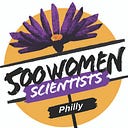My journey as a 500 Women Scientists Wiki Scholar
By Laura Guertin
Professor of Earth Science, Penn State Brandywine
Member, 500 Women Scientists Philly Pod
As a scientist and educator, I often feel I am wearing two separate hats — one where the expectation is to advance the knowledge of my discipline as a scientist, and one that teaches that knowledge to students as a professor. These hats shouldn’t be separate, but I am often viewed with one hat on or the other. I’ve been teaching at Penn State Brandywine since 2001, and each semester when I start a new course by asking my students to name a scientist, they will shout out (mostly deceased) white males. Rarely will students name a female scientist, and never will a student identify me as a scientist. This is one reason I fully support the efforts of 500 Women Scientists and other organizations that make those under-represented in the science community visible and accessible to the public.
In the past, I never would have turned to Wikipedia as a place to learn about female scientists or any science. I didn’t trust the quality of the content on the site, and I didn’t trust the ability of my students to be able to evaluate the quality of material on their own. This information literacy skill is under-developed in students, and a lack of access to libraries and librarians is one of the key reasons.
When I was doing some research on information literacy, I was reading up on libraries in the Philadelphia School District, one of the largest school districts in the nation and a feeder district for my campus. In 1992, the Philadelphia School District had 200 certified school librarians — as of 2017, the number of school librarians went down to eight, leaving many school libraries closed entirely. Research shows that children who attend schools with libraries and certified librarians fare better academically. This has me revisiting what I see in my own students currently, and what I’ll see in future students, especially with public and school libraries closed during the pandemic — leaving students without access to sources and library science instruction.
With schools in remote instruction mode, where are students turning to get information for their assignments? The internet. What comes up first when students do a Google search? A Wikipedia page on that topic. This was a key motivator for me to become involved in making sure that the information on Wikipedia is current and reliable, and that we minimize the gaps in who is represented on Wikipedia for students to learn about.
The 500 Women Scientists Wiki Scholar Program opened up at the right time. In May and June 2020, I was one of twenty women selected for an amazing professional development opportunity, tasked with the outcome of editing or creating two biographies of female scientists on Wikipedia. Maryam Zaringhalam joined us on the first day to share that Wikipedia is the 5th most highly visited website in the world, receiving 32 million views every day. Yet 18% of the English biographies are about women. We were reminded of the work of amazing scientists like Jess Wade and her efforts to increase the representation of scientists in Wikipedia. Through this program, the amazing WikiEdu staff led us through six weeks of Zoom instruction twice a week and provided a Slack channel for support and community building.
Our collective efforts were recorded in the program’s dashboard. I added to two existing pages of female scientists and created three new biography pages for female oceanographers.
What did I learn by participating in this program? I learned about the notability criteria that Wikipedia has in place that individuals are evaluated against to see if they “qualify” to have a page on Wikipedia. I learned about the WikiProject Women In Red list that has identified women that meet the notability requirements but do not have biography pages. I learned there are many women deserving to be a part of Wikipedia and need our help to have their profiles published.
But the most important takeaways showed me that my efforts, even the small page edits, make a difference in strengthening the presence of women in STEM on Wikipedia. And by being an active editor, I was able to overcome my mind block for Wikipedia not being a reliable source, now that I see the sources cited for the information on pages and how pages are created. Not only can I help students navigate using Wikipedia as a resource in the future, but I will also explore how to have students become editors for STEM-related pages through the WikiEdu Teach with Wikipedia program.
My own time as an editor is not done. I’ve continued to participate in Edit-A-Thons, such as the recent SACNAS x 500 Women Scientists event. I will continue my own efforts and work to mentor others to increase the number of female scientist biographies. And soon, perhaps, when I ask my students to name a scientist, they may name a female scientist they learned about on Wikipedia.
